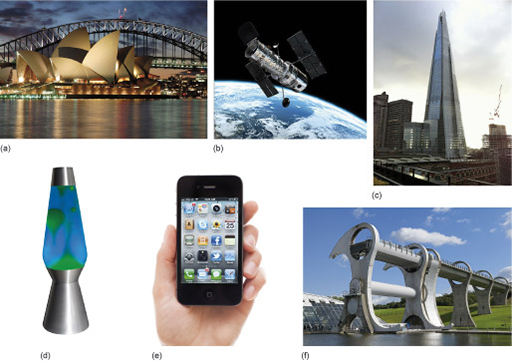1 Engineering beginnings
1.1 What is engineering?
At seven o'clock this morning my manufactured alarm radio awoke me in my manufactured bed. I went to my bathroom, with its manufactured fittings, showered with manufactured shower gel, dressed in my manufactured clothes and came down the constructed stairs to eat my manufactured breakfast. My selectively bred (but otherwise unmanufactured) cat greeted me, and I opened a manufactured can of manufactured food for her. Outside, in the old tree in my garden (all organised, hybridised and fertilised by human intervention) a blackbird called his territory: the first wild thing of the day.
Look around yourself. Recognise just how much the material environment we live in is of our own making; it has been engineered. Even to provide a simple container of shower gel has required, if you think about it, interactions among lots of people engaged in an enormous range of activities.
Activity 1 (exploratory)
The soap used in a shower gel is usually made by reacting a fat (often a vegetable oil) with an alkali (a generic name for a type of chemical).
In three minutes, write down as many things/people/activities as you can think of that are involved in getting a shower gel from raw materials to the container in your bathroom.
Answer
- supply of vegetable oil, which requires farmers to grow oil seed
- oil processing plant
- harvester for crop
- plough to cultivate land
- fertiliser and pesticides
- roads to transport to and from farm
- bricks/cement to build factory
- people to make all these things
- fuel for tractors, trucks, etc.
- steel industry, which implies mining
- alkali industry
- soap-making plant
- shower gel production plant
- plastic container for shower gel
- printing for container – inks, dyes
- cardboard boxes to pack shower gel containers for transport to shops
- forestry for wood pulp for packaging
- electricity supplies for factory machines.
My three minutes are up and I've not got the shower gel to my home yet!
That simple example is sufficient to remind you of the great breadth of 'economic activity' that supports our modern industrialised lifestyle. Perhaps because we have been born into this 'civilisation', rather than chosen it, the depth of our dependence on its intricate, interlocking systems of supply is not so obvious. We expect our food to appear in shops, water to be on tap, sewage to disappear without thought or effort, power to come from a socket in the wall, communication to need but the touch of a few buttons. We expect to be provided with shelter from the weather, to be entertained, transported, kept in health and defended.
It is engineering that puts all this in place. All the material things – from containers of shower gel to satellites – that enable us to live our everyday life are the products of engineering (Figure 1).

People have recognised a need for some function to be achieved (e.g. de-greased and cleansed skin), thought out or discovered how it can be done (soap in the form of a shower gel), designed, set up and run the means for making the thing (raw materials, process equipment, energy source, labour and finance) and delivered it to the consumer. You can see that this nutshell description of what engineering involves already identifies or implies quite complex interactions: many different people could be engaged in different bits of the scheme. There are so many things to be decided, such as the following.
- How is the function or 'need' identified?
- Who invents solutions?
- How is the decision made to accept a particular solution?
- How is it decided to set up a production facility?
- Who designs that production facility; what production level; what resources?
- Who builds it, runs it, pays for it?
- How is the product costed; will it succeed in the market?
Different societies at different times have different answers to these questions. In a capitalist society you'll find a host of professions getting in on the act: market researchers, bankers, lawyers, steel erectors, bricklayers and joiners, machinery sales people … and engineers. So who or what are engineers and what do they do?
Ask this question of people in the street and you are likely to get many different answers. Some may think of building things, such as bridges or skyscrapers; some may think of repairing things like cars or televisions. Others may relate the word to common phrases or job titles, such as genetic engineering , software engineering or civil engineering. Yet another may tell you that engineers run factories.
If you ask 'What is engineering?' of professional engineers you'll also get many different answers. Their responses will depend on their particular backgrounds, experiences and jobs of the moment. Some will say that engineering is about making things, or developing things. Others will answer in more general terms, saying that it is about generating profit for a company or wealth for a country, or about improving the quality of life.
Clearly engineers are responsible in several ways for making some of those decisions we listed for the would-be shower gel manufacturer. Engineers handle the material aspects of the business. They will know (or be able to work out) how to design a factory suited to making the shower gel, what plant (industrial-scale equipment and its housings) is required, which raw materials to buy, how to work out what power supplies will be needed, and so on. They may be able to calculate how much all this will cost, but they probably will not control the decision of whether to invest that much in the venture. Nor will they be asked to plan the advertising campaign.
The Oxford English Dictionary defines engineering as:
The branch of science and technology concerned with the development and modification of engines (in various senses), machines, structures, or other complicated systems and processes using specialized knowledge or skills, typically for public or commercial use; the profession of an engineer. Frequently with distinguishing word: chemical, civil, electrical, mechanical, military engineering, etc.
There is a lot wrapped up in this dictionary definition, reflecting the fact that engineering draws on many different skills and covers a large variety of specialisms. The following section explores the definition through some real examples of engineering.
